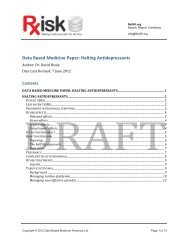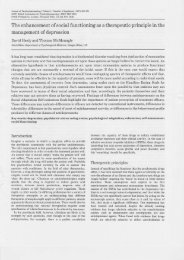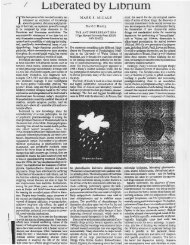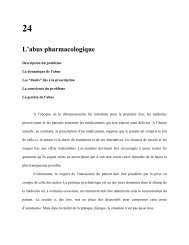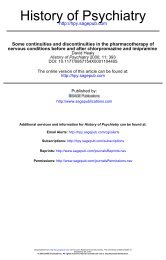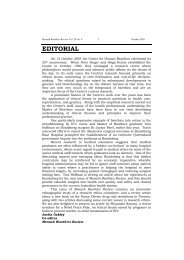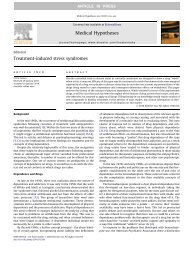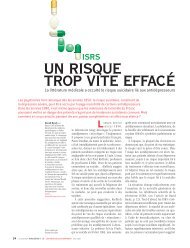Antidepressants for Prescribers - Dr. David Healy
Antidepressants for Prescribers - Dr. David Healy
Antidepressants for Prescribers - Dr. David Healy
Create successful ePaper yourself
Turn your PDF publications into a flip-book with our unique Google optimized e-Paper software.
[Type text]RxISK.orgMaking medicines safer <strong>for</strong> all of usWHAT DO ANTIDEPRESSANTS DO? They do not correct an abnormality. The antidepressants are group of very different drugs that act in quite different ways. The SSRIs -‐ selective serotonin reuptake inhibitors -‐ inhibit serotonin reuptake. When this works it reduces anxiety levels, reduces reactivity and emotionality, and produces a degree of indifference or blunting. Others inhibit catecholamine (noradrenaline/ norepinephrine) reuptake. The effect of this is vigilance enhancing, increased reactivity, greater emotionality. Others inhibit both serotonin and catecholamine uptake. Some inhibit neither. Most antidepressants also act on histamine, cholinergic, serotonergic, adrenergic and other receptors. Actions on these receptors can usefully restore appetite, or help sleep. Some older tricyclics that act on all of these function in many respects like a tonic. These different actions are obscured by company trials that make a set of diverse drugs all look the same. This is because companies want evidence to market drugs, rather than evidence to work out what the drugs actually do and who would be best treated with which drug. Many antihistamines, benzodiazepines, stimulants, anticholinergic drugs, antipsychotics, nicotine and opiates have been shown in clinical trials to be as “antidepressant” as SSRIs. They are not classified as antidepressants simply because they are not marketed as antidepressants. But all can do something useful. Benzodiazepines reduce physical and mental tension. Stimulants increase energy. Anticholinergics can be euphoriant. Antipsychotics tranquilize. The important thing is to match the treatment to the patient – just taking something because it is marketed as an antidepressant is not good enough. WHAT OVERALL IMPACT WILL ANTIDEPRESSANTS HAVE ON FUNCTION? For a severely depressed patient, given an older antidepressant, treatment may dramatically shorten the episode, save a life or marriage and get them back to work. For the less severely ill, any recovery is more likely to be due to time or placebo factors than anything else and the problem is then ensuring the patient can get off treatment. If the patient can identify a very clear benefit – such as an anxiolytic effect – there is a chance the antidepressant rather than placebo is making a difference. For the chronically depressed patient, the treatments are more likely to give side effects than do anything useful. In general <strong>for</strong> moderate depression, side effects are more likely than benefits produced by the drug. For women of child-‐bearing years these side effects include a risk of birth defects and dependence so the woman cannot get off the meds when pregnant. Copyright © 2011-12 Data Based Medicine Limited. All rights reserved. 6
[Type text]RxISK.orgMaking medicines safer <strong>for</strong> all of usIf the patient is on a cocktail of drugs, you might ask the question how you would function on this cocktail and if the answer is not very well, then it is unlikely the patient will be doing much better. ARE THE EFFECTS OF ANTIDEPRESSANTS DOWN TO PLACEBO? Many publications state that 5 out of 10 people respond to antidepressants and 4 out 10 respond to placebo, giving the impression that the effects of antidepressants are all in the mind. They aren’t. The data show that many get better without medication, which is different. If the question in these trials had been are SSRIs anxiolytic, the answer would have been yes. If tested <strong>for</strong> anxiolytic effects, the SSRIs are as easy to distinguish from placebo as alcohol is. They clearly work in this sense but just like alcohol their benefits are marginal in depression trials. To give antidepressants indiscriminately on the basis of these clinical trials makes as much sense as giving alcohol would. Just as there is a right time and person <strong>for</strong> alcohol therapy, so also there is a right drug <strong>for</strong> someone who is nervous and a right time to give it. Just as the hazards of alcohol deter us from using it as a treatment, the antidepressants come with side effects that are not in the mind – risks of getting hooked, birth defects, impaired sexual functioning, strokes, fractures, suicide and homicide, and in children stunted growth. It may make sense to take these risks if there is a clear benefit from treatment. But what the trials showis that many doctors when they see a patient improve on treatment assume that the treatmenthas produced the benefit – without asking the patient whether they can detect anything usefulthe treatment is doing.In contrast any side effects risk being attributed to the illness rather than the pill. ACUTE TRIALS & CHRONIC TREATMENT In the 1960s the first trials of the antidepressants assumed they were like antibiotics and only lasted a few weeks. Trials today still only last a few weeks, even though many people are likely to be on an antidepressant <strong>for</strong> months or years. Trials this short produce a sign the drugs may work rather than evidence they actually do work. If the drug gets through trials like this and gets on the market, this is the point at which the research to work out who benefits from this drug should start – but this doesn’t research doesn’t happen. Having any drug chronically is a recipe <strong>for</strong> the unexpected. As with nicotine, HRT, alcohol or other drugs taken over time, it is all but certain that significant problems will emerge in some who take antidepressants <strong>for</strong> years. WHEN SHOULD I TAKE TREATMENT? For severe depressions, in trials from the 1980s tricyclic antidepressants were significantly more effective than SSRIs. For depressive psychoses adding an antipsychotic to a tricyclic antidepressant has been shown to help. For patients with a significant melancholic disorder or depressive psychosis, ECT is effective. SSRIs and other newer antidepressants have not been shown to work <strong>for</strong> melancholia. Copyright © 2011-12 Data Based Medicine Limited. All rights reserved. 7
[Type text]RxISK.orgMaking medicines safer <strong>for</strong> all of usSSRIs are much more useful <strong>for</strong> some nervous states such as obsessive compulsive disorder than other antidepressant groups are. There is a notable difference between severe depression and treatment resistant depression. Pure severe depression responds to treatment – but depressions that don’t respond to treatment may also end up being viewed as severe because they don’t respond when in fact socially complex conditions rather than biologically severe illnesses are least likely to respond to pills. Many of us have favorite combinations of drugs <strong>for</strong> use in treatment resistant cases -‐ such as adding lithium or an anticonvulsant to an antidepressant that appears not to be working. This is often done on the basis of seeing some dramatic responses on this combination but caution is needed in that none of these combinations have ever been shown in controlled trials to work reliably. If the patient does not show a rapid response to the addition of another drug, they should probably not be kept on any combined treatment <strong>for</strong> long. It is more likely that something in the combination of treatments or other drugs they may be on is holding them back than it is that the combination will suddenly start helping. ARE THERE ANY PROBLEMS WITH TREATMENT COMBINATIONS? Yes. The reason combinations are prescribed is that each drug has been supposedly shown to work in clinical trials. But the trials have not shown these drugs work – they have shown that is not right to say the drugs do nothing. If someone is not getting better it might make sense <strong>for</strong> them to be on 4-‐5 drugs all of which work. But it makes little sense <strong>for</strong> anyone to be on 4-‐5 drugs about which we in fact know very little, other than that no-‐one has investigated the effect of combining them. WHAT CAN BE DONE TO HELP THE PATIENT IF I DON’T PRESCRIBE PILLS? For many people the best help may lie in a decision that their difficulties do not stem from an illness. For many other nervous states the answer is: Time: Most people who are “depressed”, nervous or anxious, have a condition that clears up in 12-‐16 weeks whether treated or not. Hygiene: It seems likely that attention to physical activity, diet, sleep hygiene and limiting alcohol or other substances helps. Problem solving: It seems likely that tackling problem in relationships or at work can make a difference. There is more evidence that these factors or some combination of these factors produce benefits in ‘primary care’ depression or anxiety than there is <strong>for</strong> either pills or talk therapy. The choice is not just between pills and talk therapy – the best attested approach is watchful waiting from a competent clinician. Copyright © 2011-12 Data Based Medicine Limited. All rights reserved. 8
[Type text]RxISK.orgMaking medicines safer <strong>for</strong> all of usAs the disorder becomes more severe (melancholia/ depressive psychoses) the evidence <strong>for</strong> a benefit of tricyclic antidepressants over placebo gets stronger, and ultimately ECT. SSRIs, other antidepressants and talk therapies do not work <strong>for</strong> melancholic depressions. If a condition becomes more enduring, the treatment options become more complex and may vary all the way from changing work or relationships to a full investigation of contributing physical factors. Consideration should always be given to the role that current medications may have in stalling recovery – <strong>for</strong> every 9 people out of 10 who have the expected response to a drug, there will be 1 out of 10 who has just the opposite response. The only way to assess this is to stop treatment. MYTHS ABOUT ANTIDEPRESSANTS 1. There is a lowering of Serotonin or a chemical imbalance in depression.This idea had been discarded by the early 1970s but was resurrected with the marketing of the SSRIs – there is nothing to it other than marketing copy. There is almost certainly some physical disorder in severe melancholia – but no-‐one knows what it is. Over 90% of the serotonin in the body is in the gut or cardiovascular system – which means that drugs acting on serotonin reuptake are likely to have potent effects throughout the body – impairing sexual function, remodeling bones, making hemorrhages more likely. 2. Depression causes birth defects.This is completely untrue but is used to scare women who are pregnant into taking antidepressants against their better judgment. <strong>Antidepressants</strong> increase rates of birth defects, miscarriages, and development delay in children. 3. <strong>Antidepressants</strong> take several weeks to work.This is completely untrue. These drugs produce benefits and harms within hours or days of first taking them. It may take several weeks <strong>for</strong> a clinical syndrome to lift but this is something quite different. The argument that the drug takes time to work is trotted out as part of the defense against claims that an antidepressant has triggered suicide or violence. 4. <strong>Antidepressants</strong> do not cause AddictionMany antidepressants cause people to be hooked to them – it becomes impossible to stop because of how bad the person feels on stopping and the relief from restarting treatment. Some drugs are worse than others. Because companies have denied there is any problem, it is difficult to know which antidepressants are the worst offenders and how to manage the problem. Companies and their experts refer to discontinuation syndromes – another term <strong>for</strong> withdrawal or being hooked – in attempt to avoid the stigma of withdrawal. But even national regulators now concede it may be impossible to stop certain antidepressants. Copyright © 2011-12 Data Based Medicine Limited. All rights reserved. 9
[Type text]RxISK.orgMaking medicines safer <strong>for</strong> all of us5. <strong>Antidepressants</strong> should not be given to bipolar disorder patients.The depression in manic-‐depressive disorder is identical to straight<strong>for</strong>ward depression and the response of both depressions to the drugs is similar. Some experts suggest the patients likely to become suicidal on antidepressants are bipolar patients who are misdiagnosed as who should have been put on a mood-stabilizer. They also suggest that antidepressants destabilize bipolar disorders and lead to a greater number of episodes. Mood-‐stabilizers can also cause suicide, even in patients with no psychiatric condition, and no mood stabilizer has been shown to reduce the number of episodes that patients have (see Guidance on Mood-‐Stabilizers). 6. (For the Specialist) Anticholinergic drugs cause urinary retention and other serious sideeffects.This been an article of faith in textbooks and reviews <strong>for</strong> almost 50s years. It is without foundation. When antidepressants cause urinary retention it is down to their actions on the catecholamine system. The fact that such an obvious mistake as this should have been enshrined as Holy Writ should cause serious doubts as to how much else is solidly based. It is in areas like these – mythologies about chemical imbalances and addiction -‐ that doctors need to help patients and patients need to help doctors to escape the clutches of company marketing that has been so successful that many will be astonished to know that things they have taken from granted have no basis in science. PATIENT SPECIFIC QUESTIONS WHAT DO I KNOW OF THIS PATIENT’S PROS & CONS? The risks they might be happy to live with and the one’s they wouldn’t, and how important improvement is compared to other things in their life? WHAT ARE THIS PATIENT’S OPTIONS? Unless there is a real risk of danger to self or others, and good evidence of a beneficial response to treatment, there are always other options. It’s a matter of finding them – but this is made difficult at the moment by the fact that increasingly doctors face the sack if they deviate from a conventional line. DO PATIENTS IN ANTIDEPRESSANT TRIALS RESEMBLE THIS PATIENT? Many of the people in antidepressant trials were recruited by advert, a lot were volunteered by their doctor rather volunteering themselves, and none gave in<strong>for</strong>med consent to having their data sequestered. Investigators have been jailed <strong>for</strong> inventing patients <strong>for</strong> these trials. If the patient is severely depressed – there were almost no people with severe depression. If the patient is being treated <strong>for</strong> another condition in addition to depression or anxiety, there were few people like them in the trials. Copyright © 2011-12 Data Based Medicine Limited. All rights reserved. 10
[Type text]RxISK.orgMaking medicines safer <strong>for</strong> all of usHOW DO I KNOW WHICH ANTIDEPRESSANT TO GIVE? There is no research on this important question. HOW LONG DOES THE PATIENT HAVE TO BE ON TREATMENT? Half of those put on an antidepressant stop within a month – in part because of side effects. There is no research to match any individual patient with optimal time on treatment. If the drugs work, the original clinical view was that 3-‐4 months was adequate. Recent industry linked views have shifted from 6-‐12 months, to a year and since then to indefinite treatment. WHAT ARE THE RISKS? The standard list of side effects in the manufacturers in<strong>for</strong>mation leaflets include nausea, vomiting, sedation, constipation, fainting, palpitations, sweating, tremulousness, headache, blurred vision, rashes, weight gain, along with depersonalization, derealization, confusion, mania, and psychosis. The in<strong>for</strong>mation leaflets that come with medications are written by drug companies. They need to be viewed with caution. They can vary dramatically in what they say about problems linked to a drug from country to country – with a drug having potentially lethal side effects in one country that don’t show in another. Depending on the <strong>Dr</strong>ug, antidepressants can also cause: • Sexual Dysfunction (over 50% – this may persist after stopping treatment) • Dependence leading to significant withdrawal problems (up to 50%), • Anxiety or agitation – severe in 20% of cases • Birth defects – double the underlying rate • Miscarriages – double the underlying rate • Suicide – up to 1 in 100 will engage in a suicidal act. • Violence – up to 1 in 100 will engage in an aggressive act. • Disinhibition – Change of Personality. We don’t fully know how this happens and need good descriptions of what changes in people on these drugs to produce this outcome. It may be a change of personality <strong>for</strong> the better or <strong>for</strong> the worse. THE RISKIEST RISKS As with asthma drugs and respiratory side effects or drugs <strong>for</strong> Crohns’ disease and gut side effects, your biggest problems with antidepressants are likely to come from side effects drug companies are likely to portray as stemming from depression – in this case suicidality, anxiety, change of personality, birth defects, sexual dysfunction, insomnia. Almost anything can be portrayed a feature of or stemming from depression. These side effects also ambush people like premenstrual tension so that even the patient may not make a link until the drug is stopped and the problem clears. Your challenge is to bring out the differences. A trial of stopping of treatment may be the only way to work out what is going on. Copyright © 2011-12 Data Based Medicine Limited. All rights reserved. 11
[Type text]RxISK.orgMaking medicines safer <strong>for</strong> all of usEven if you become convinced of a link, there is a general bias toward seeing prescription drugs as innocent and patients guilty, where in contrast we have no problem in seeing street or over the counter drugs as guilty. HOW LIKELY ARE THE LISTED SIDE EFFECTS OF ANTIDEPRESSANTS TO HAPPEN? No one knows. Company answers are that if they have happened even once we have to list them. This implies they are rare. But in fact side effect data are not collected properly. The best example are the sexual side effects of SSRIs which companies listed as happening in less than 5% of cases when in fact they happen in somewhere between 50-‐100% of cases. HAVE I ACCESSED ANY INDEPENDENT DATA ON THE RISKS LINKED TO TREATMENT? WHAT UNACKNOWLEDGED RISKS CAN REASONABLY BE SUSPECTED? On launch the antidepressants should have come with clear statements about the risks of dependence, withdrawal, birth defects and other difficulties. We simply do not know what chronic actions on the serotonin system might trigger <strong>for</strong> good or bad. PERIODS OF RISK Just as <strong>for</strong> space shuttles, many of the dramatic problems antidepressants cause cluster around take-‐off and landing. Initial exposure is associated with agitation up to and including suicide. Problems also emerge when the dose is being reduced or shortly after the treatment is stopped or when the dose is adjusted in the course of treatment. Aside from risk periods like these that are associated with agitation and dependence, there are legacy problems that may appear in the course of treatment and in some instances endure long after treatment stops. DO ANTIDEPRESSANTS CAUSE PROBLEMS? Companies typically deny their drug causes any problems. The key word here is cause. One company tactic is to claim no drug causes a problem unless a clinical trial has shown that the drug is statistically significantly more often linked to the problem than placebo. When a company fails to do the trials to investigate potential problems they can deny a link <strong>for</strong> ever – even in the face of convincing evidence of a problem emerging on treatment, clearing when the treatment is stopped and reappearing when treatment is restarted. When an event like a suicide happens, companies will say their drug could not have caused this person to kill themselves in a manner that gives the impression they believe their drug cannot ever cause a suicide. If asked a direct question – can your drug cause suicide? -‐ they are legally obliged to answer Yes. The same happens with many other side effects. Copyright © 2011-12 Data Based Medicine Limited. All rights reserved. 12
[Type text]RxISK.orgMaking medicines safer <strong>for</strong> all of usOr companies direct questioners to medical academics, who, unlike companies, can say whatever they want – and many can be depended on to deny the drugs cause any problems. Finally faced with enquiries on risks from dependence to birth defects, companies will typically suggest patients Talk to your Doctor. But doctors only have the public domain in<strong>for</strong>mation that denies a link to problems and will be completely unaware that in many cases internal company determinations will have decided the drug does cause the problem. This is a way to pin legal liability <strong>for</strong> failing to detect problems on the doctor. COULD MY DRUG HAVE CAUSED THIS DOCTOR? Doctors who report on drug related adverse events get it right in over 80% of cases. If several doctors report the same thing, it becomes almost a certainty that the drug is causing the problem reported in at least some patients. We are confident in your observations to the extent that we intend to look <strong>for</strong> possible genetic inputs to adverse events in cases where physician reported phenotypes achieve the kind of definition required <strong>for</strong> such studies. STOPPING? Treating and stopping antidepressants is not the same as not-‐treating. <strong>Antidepressants</strong> come with significant withdrawal and legacy effects. Depending on the antidepressant up to 50% of people may have difficulties with withdrawal (See DBM withdrawal guidance). It may be possible to minimize withdrawal problems by tapering the drug very slowly using liquid <strong>for</strong>mulations. But <strong>for</strong> many this doesn’t seem to work. The issue may be complicated by legacy effects of antidepressants. Some people seem to develop a dysthymia that becomes manifest as they try to stop treatment. This does not seem to be withdrawal. Some features such as dysthymia, an intolerance or stress or memory difficulties can endure <strong>for</strong> years after treatment stops. For some there may be persistent sexual dysfunction, SSRI antidepressants can blunt normal emotions such as anger. Stopping them can lead to a resurgence of these emotions in someone who is no longer used to dealing with them posing significant problems. Finally there is a great deal of data suggest some antidepressants may make depressive relapses more likely. If they have read the patients’ version of this guidance, your patient might want to stop their antidepressant immediately. What is clear is if your patient is an older person and on several different drugs, stopping some of their drugs is likely to increase their life expectancy, and reduce their risk of hospitalization. This ideally should be done under your guidance. Copyright © 2011-12 Data Based Medicine Limited. All rights reserved. 13
[Type text]RxISK.orgMaking medicines safer <strong>for</strong> all of usWHAT IS THIS PATIENT’S RISK OF STOCKHOLM SYNDROME? Stockholm syndrome happens when a person’s life is in danger, when they are isolated and when their captor in kind. They end up identifying with their captor and wanting to keep him/her happy. Illness puts someone in danger and isolates them and doctors today are increasingly trained to be nice to patients. But your training has not taken into account that when asked about problems even the most sophisticated patients who are having grave difficulties from treatment will likely tell you that everything is going wonderfully or at best hint obliquely about problems. Unless you have actually reported adverse events on drugs, even if you are otherwise a wonderful doctor, you may be inducing Stockholm syndrome. WHAT KIND OF DOCTOR AM I? Just as they would do <strong>for</strong> any consumer, companies segment doctors into types. High Flyers are those doctors who prescribe the latest drug, <strong>for</strong> the newest indication, often in the highest doses, or in combinations, often be<strong>for</strong>e many of their colleagues have ever used it. For these doctors the pitch is about medical heroism Skeptical Experimenters are doctors who might try out something novel but do so in a gingerly fashion; these get a pitch about collaborative care. Rule Bound Doctors are the ones who like to keep to Guidelines and other official advisories; these get a pitch based on guidelines. The Conservative Majority are the majority of doctors who assume that what most of their colleagues are doing is likely to be right or at least safe. They like drug therapy to be uncomplicated – so the appeal to them may be about convenient <strong>for</strong>mulations such as once a day dosing – leaving them time to focus on other aspects of care. Not knowing what type you are is not a crime -‐ the authors of this guideline don’t know what type they are – but it is something to bear in mind. COULD MY JUDGEMENT BE AFFECTED IN ANY WAY BY A TARGET I SHOULD MEET? Every doctor today who wishes to offer good medical care is increasingly at risk of getting the sack as good care diverges systematically from officially endorsed healthcare inc. If you follow this guidance, you will <strong>for</strong> instance be at odds with a growing number of guidelines. But these are guidelines <strong>for</strong> diseases rather than guidance <strong>for</strong> people. We hope you will join us in trying to work out what to do <strong>for</strong> people and in reshaping medical practice to fit. Copyright © 2011-12 Data Based Medicine Limited. All rights reserved. 14
[Type text]RxISK.orgMaking medicines safer <strong>for</strong> all of usAPPENDIX – COMMON ANTIDEPRESSANTS Generic drug name Trade name US trade nameTricyclic antidepressantsAmitriptyline Tryptizol/Lentizol Elavil/EndepImipramine Tofranil TofranilNortriptyline Allegron AventylDesipramine Pertofran/Norpramin Pertofrane/NorpraminClomipramine Anafranil AnafranilDosulepin Prothiaden –Lofepramine Gamanil/Lomont –Doxepin Sinequan Adapin/SinequanTrimipramine Surmontil SurmontilMonoamine oxidase inhibitors (MAOIs)Phenelzine Nardil NardilMoclobemide Mannerix/Aurorix –Serotonin reuptake inhibitorsCitalopram Cipramil CelexaEscitalopram Cipralex LexaproFluvoxamine Faverin --Fluoxetine Prozac ProzacParoxetine Seroxat PaxilSertraline Lustral ZoloftVenlafaxineDesvenlafaxineEfexorPristiqEffexorPristiqDuloxetine Cymbalta CymbaltaOther antidepressantsBupropion (Zyban – smoking cessation) WelbutrinMaprotiline Ludiomil LudiomilMirtazapine Zispin RemeronL-tryptophan Optimax TrofanReboxetine Edronax –Trazodone Molipaxin DesyrelAgomelatine Valdoxan Valdoxan1 See <strong>Healy</strong> D (2004). Let Them Eat Prozac. New York University Press, New York; <strong>Healy</strong> D (2012)Pharmageddon. University of Cali<strong>for</strong>nia Press, Berkeley.2 Turner EH, Matthews AM et al (2008). Selective publication of antidepressant trials and its influence onapparent efficacy. N Engl J Med358, 252-260.3 <strong>Healy</strong> D (2012). Pharmageddon. U of Cali<strong>for</strong>nia Press, Berkeley4 Jefferson R, Doshi P et al (2011). Ensuring safe and effective drugs: who can do what it takes? BMJ342, 148-151.5 Unpublished data – communication from FDA.Copyright © 2011-12 Data Based Medicine Limited. All rights reserved. 15



